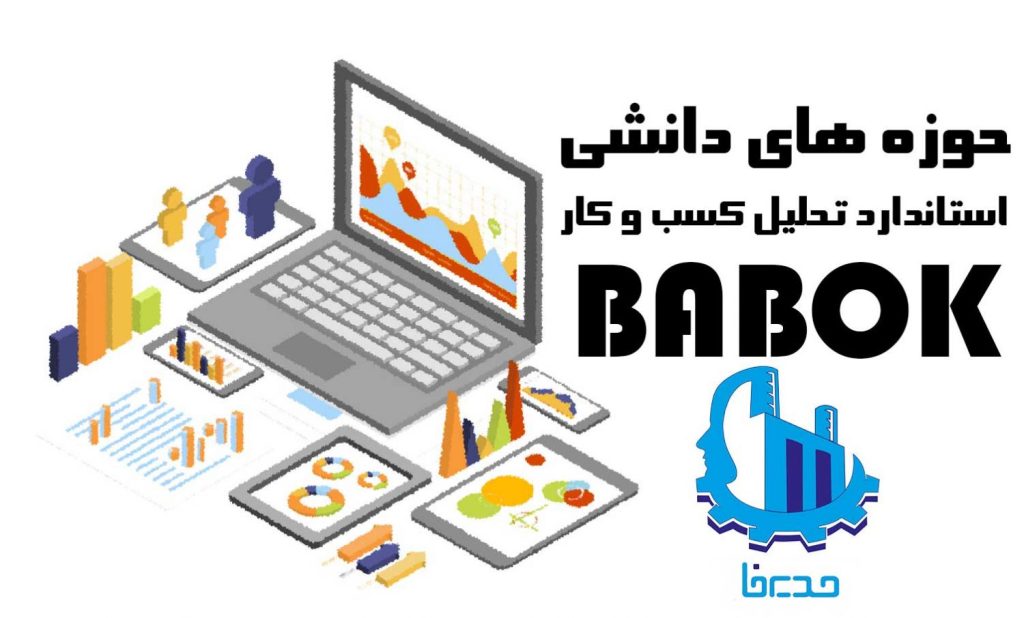
Contact us if you need free advice on business analysis.
02188764867
02188761795
BABOK standard business analysis and knowledge areas
In order to create value for customers, the implementation of the BABOK standard introduces five aspects to create initiatives and actions, including agility, business process management, business architecture, information technology and business intelligence.
In every business and organization, the goal is to create value for the beneficiaries, especially the customers.
The study of business is done based on these five perspectives in the organization, which leads to the adoption of measures and the implementation of initiatives. Finally, each of these actions and initiatives is studied in 6 fields of knowledge. In the following, we discuss in detail about business analysis, business analysts and relevant fields of knowledge.
Who does business analysis (BABOK standard)?
But to establish BABOK and implement BABOK, the organization needs a business analyst. In order to perform business analysis, the business analyst must play the following roles in the organization:
- Understanding the issues and goals of the organization
- Analysis of needs and solutions
- Design strategies
- Change of direction and leadership
- Facilitate interaction with stakeholders
These analysts can be people inside the organization who are aware of the BABOK standard, and they can be consultants who enter the organization from outside the organization and establish the business analysis thinking in the organization. But who is a business analyst?
Business analyst
A business analyst is any person who, regardless of their job title or organizational role, performs the business analysis tasks described in the BABOK standard. Business analysts are tasked with discovering, analyzing pre-project post-project information.
Other common job titles for people who do business analytics include:
- Business architect
- Business systems analyst
- Data analyst
- Organizational analyst
- Management Consulting
- Process analyst
- production manager
- Product owner
- Requirements engineer
- system analyst
Conduct business analysis
The key concepts that the organization or a business analyst needs for business analysis based on the BABOK standard:
Business Analysis Conceptual Model (BACCM)
Define a general framework for business analysis
Business Analysis Conceptual Model (BACCM) is a conceptual framework for business analysis. The term consists of six concepts that have a common meaning to all business analysts and help them discuss both business analysis and its relationships with common terms. Each of these terms is considered a core concept.
These main concepts include change, need, solution, beneficiary, value and context of the organization.
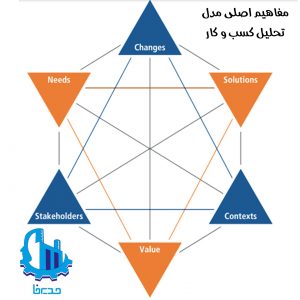
Key concepts in the BABOK standard
Proper presentation of essential concepts for the organization, due to their importance in the BABOK standard, the analyst must be proficient in these concepts and their goals.
These concepts include business analysis information, design, enterprise, organization, planning, requirements and risk.
The text of the BABOK standard states that an enterprise can include one or more organizations that strive to achieve a common goal.
Classification of requirements in the BABOK standard
Appropriate definition of different levels of requirements, which should be well defined in this category, shareholders, customers and internal stakeholders should be well identified and their requirements should be categorized.
These requirements include the following list:
Business Requirements: Statements of status, goals, missions, and outcomes that describe the rationale for the change. These requirements can apply to an entire company, a business area, or a specific process.
Beneficiary requirements: It describes the needs of the stakeholders that must be met to achieve the business needs. Stakeholder requirements can act as a bridge between business requirements and solution requirements.
Solution requirements: Describe the capabilities and qualities of a solution that meet the needs of stakeholders. These requirements provide the appropriate level of detail to enable solution development and implementation. Solution requirements can be divided into two subsets:
Functional requirements: Describe the capabilities and information that a solution can provide to management.
Non-functional requirements: are not directly related to the performance behavior of the solution, in fact they describe the conditions under which a solution remains effective or the level of quality that a solution should have
Beneficiaries
Define the roles and characteristics of groups or individuals who participate in or are affected by a change in the business analysis process.
Design models and requirements
Appropriate design of business processes in such a way that operational levels work to meet the requirements and needs of stakeholders.
To better understand this concept, consider the following example:

The design cycle based on BABOK standard requirements is as follows:

Requirements for changes of status
This category of requirements makes it clear what the current state of the system is and what should be done after the implementation of the solutions.
BABOK standard knowledge areas
In the BABOK standard for business analysis, 6 fields of knowledge have been introduced, which include the following fields:
- Planning and monitoring business analysis
- Information extraction and interaction with stakeholders
- Requirements Lifecycle Management
- Strategic analysis
- Requirements analysis and design definition
- Evaluate the solution
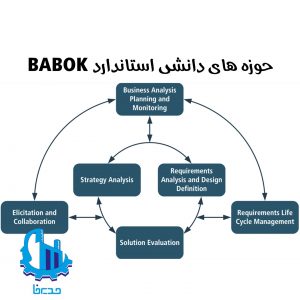
Tools
In the BABOK standard for business analysis, a set of efficient tools for identifying issues, determining and explaining strategy, analyzing stakeholders and providing effective solutions have been collected, which are as follows:
- Brainstorming sessions
- Root analysis
- Process analysis
- Risk management and analysis
- Data analysis
- Data modeling
- SWOT matrix
- And…
We are always waiting to receive your comments, questions, criticisms and suggestions in Noor consulting engineers group (Modirfa). Contact us if you need free advice on business analysis.
As you have noticed, many fields of knowledge, techniques and tools are not easy to learn and require experience in updating them, not just academic training. Noor Management Consultants Group (Modirfa) is proud to announce that it is ready to travel with you, dear managers, on the way to achieving excellence with its precious savings from 1987 to 2018 in the implementation of various management system master's degrees in pioneer organizations of our dear Iran. .
Beware of unlicensed and fraudulent organizations.
Be sure that if an organization gives you an ISO certificate without implementing it in your organization and conducting an audit, it must be a fraud.


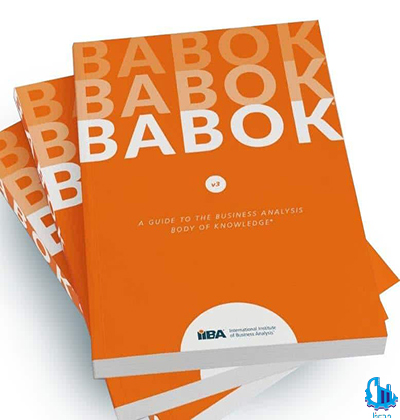
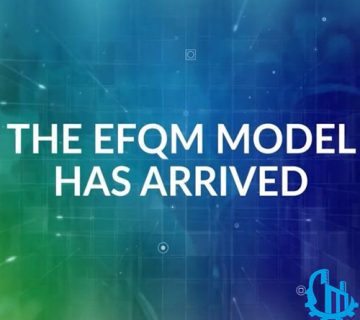


No views